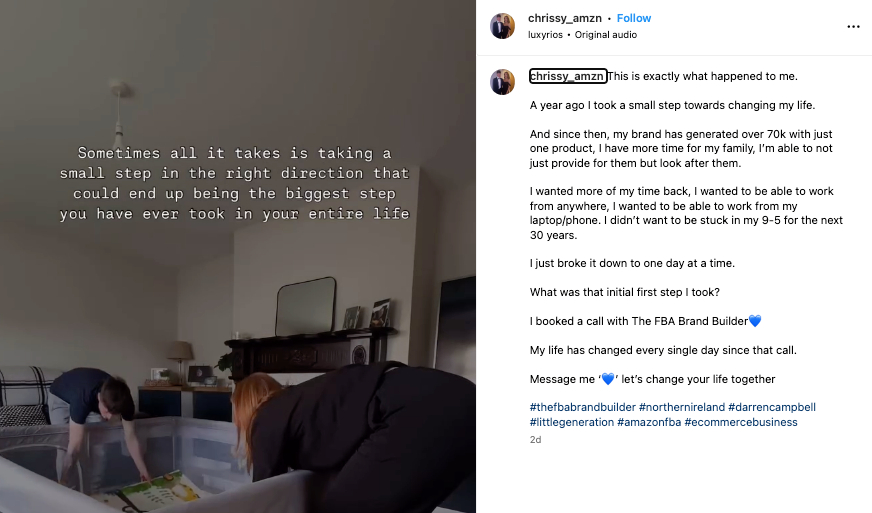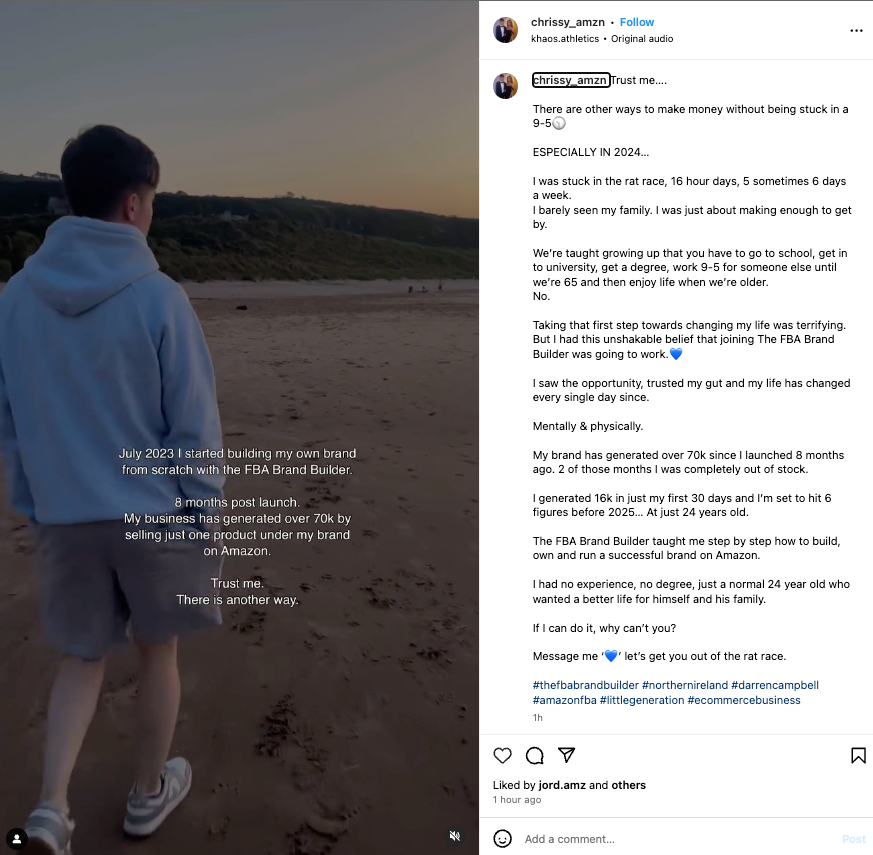After exploring Aoife Kelly's highly promotional FBA Brand Builder Instagram account, it’s impossible not to notice the similarities with another recent convert: chrissy_amzn. Chrissy’s account is packed with personal stories and motivational messaging that closely mirrors the FBA Brand Builder playbook, designed to hook potential recruits. Here’s a closer look at Chrissy’s posts and how they echo the same themes we’ve seen in other Brand Builder affiliates.

Repeating the Script: A Relatable Transformation Story
In several posts, Chrissy describes feeling stuck in a grueling 9-5 routine, detailing long hours and limited time with family. He talks about his decision to take a leap of faith with FBA Brand Builder, presenting it as the path that transformed his life—financially, emotionally, and mentally. In one post, he mentions, "My brand has generated over 70k since I launched 8 months ago," while urging followers to join the program with lines like, “If I can do it, why can’t you?”
This narrative aligns almost identically with Aoife’s story, where the emphasis on financial success, breaking free from the 9-5, and newfound personal fulfillment are front and center. These accounts use a “rags to riches” tone that is evidently designed to resonate with those who feel dissatisfied in traditional employment, presenting FBA Brand Builder as the ultimate solution.
Lack of Financial Transparency
Similar to Aoife, Chrissy shares impressive revenue numbers without detailing costs, profit margins, or the realities of maintaining his supposed success. Chrissy’s post claims, “I generated 16k in just my first 30 days,” but fails to explain the business expenses involved, whether he’s achieved profitability, or if these earnings are sustainable. Without this clarity, the numbers can feel more like bait than a genuine benchmark of success, potentially misleading followers into thinking that such earnings are straightforward and easily replicable.

Motivational Language and the Hard Sell
Chrissy’s messaging is peppered with phrases like “Stop letting fear dictate your life” and “There are other ways to make money without being stuck in a 9-5,” tapping into themes of empowerment and the fear of regret. This motivational approach, however, closely follows Darren Campbell’s own tone, as well as that of other Brand Builder affiliates. In essence, his account seems less about his brand’s journey and more like a carefully scripted recruitment tool for the FBA program.
His posts also feature direct calls to action, urging followers to message him if they’re “ready to change their life,” which reads as more of a sales pitch than genuine advice. The structured, repetitive nature of his content—highlighting risks, sacrifices, and rewards—echoes a well-worn FBA Brand Builder script aimed at drawing in people who might be teetering on the edge of commitment.
Social Media Amplification: Strategic Reshares for Reach
As with other affiliates, Chrissy’s posts frequently reshare Darren’s content, and vice versa, creating an echo chamber that amplifies FBA Brand Builder’s reach across social media. Right after posting his success stories, Chrissy quickly reshared Darren’s posts featuring his profile, further promoting the Brand Builder community’s narrative. This coordinated reshare strategy appears to be a calculated move to boost visibility and reinforce the program's credibility by showcasing “success stories” across multiple profiles.

Potential Disclosure Issues: Compliance with UK Advertising Laws
One of the most concerning aspects of these accounts is the lack of transparency regarding any referral fees or commissions that might be involved. If Chrissy receives financial benefits for promoting FBA Brand Builder, UK advertising regulations require him to disclose this with tags like #Ad or #Sponsored. Yet, his posts make no such disclosures, leaving followers unaware of possible financial incentives behind his endorsements. As we previously noted with Aoife, this absence of transparency could constitute a breach of advertising rules and raises questions about the authenticity of these “success stories.”
Patterns and the Bigger Picture
Darren Campbell has publicly dismissed accusations of using paid actors, claiming his success stories are genuine and organic. But the strikingly similar language, repetitive themes, and the tight coordination among Brand Builder affiliates suggest a scripted, formulaic approach to social media marketing. Whether or not these participants are directly compensated, the promotional nature of their content strongly resembles influencer marketing tactics, potentially blurring the line between genuine entrepreneurial success and orchestrated recruitment efforts.
Wrapping Up: Is It a Success Story or a Sales Pitch?
Chrissy’s account, like Aoife’s, presents a polished, persuasive image of success with Amazon FBA through the FBA Brand Builder program. However, the lack of financial transparency, the almost identical motivational messaging, and the absence of disclosure regarding potential referral incentives make it difficult to discern where genuine storytelling ends and marketing begins.
For potential recruits, it’s crucial to read between the lines. While the success stories may seem inspiring, the lack of detail and transparency should prompt caution. As we’ve highlighted in our previous coverage, these accounts align closely with Darren Campbell’s promotional agenda, suggesting a more complex reality behind the glossy social media posts.
Closing Statement to Darren Campbell and the FBA Brand Builder:
Darren, it's clear your approach is built on misleading people. Tasking participants with creating separate Instagram profiles solely to promote your program—without clear disclosure or transparency—is not only deceptive but skirts dangerously close to violating advertising laws. By encouraging these affiliates to omit any “Ad” or “Sponsored” tags, you’re pushing them to break UK advertising regulations, which demand clarity and honesty from those endorsing products or services.
If this pattern of undisclosed promotion continues, we won’t hesitate to flag both your content and the individuals involved to the relevant authorities. Influencers and marketers are accountable to their audiences, and so are you. Transparency and authenticity aren’t optional—they’re legal and ethical obligations.

